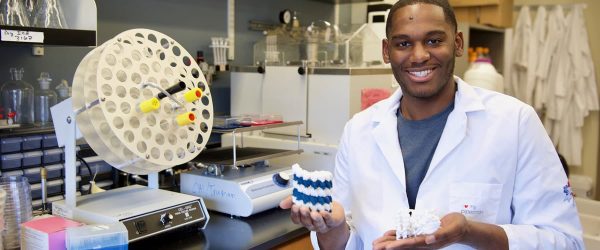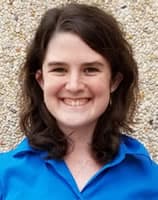Biology, engineering graduate students receive prestigious NSF awards

National Science Foundation Graduate Research Fellowships support outstanding graduate students. Devin Clegg and Corbin Grohol are two such students, and they are the latest UNC Charlotte recipients of this prestigious award.
Clegg, who completed a bachelor’s degree in exercise science at UNC Charlotte in 2016, is pursuing a master’s degree in biology. As an undergraduate, he was a member of the Charlotte 49ers football team.
The graduate student is affiliated with two research labs in the Department of Biological Sciences in the College of Liberal Arts & Sciences – the labs of marine biologist Adam Reitzel and molecular and cell biologist Richard Chi. Clegg’s research combines molecular biology and protein biochemistry to uncover how genomes evolve in animals.
“I am looking into an organism that is not a conventional model organism to use for my project,” he said. “I am going to use the sea anemone, a cnidarian, and since it’s not a very well-known model, I think that was a big aspect of my selection for the fellowship. What I am researching is a transcription factor. It’s a protein that aids in the regulation of other specific proteins that help with things ranging from normal development to antioxidant properties and many other things.” (Read more on CLAS Exchange).
 Grohol, a Charlotte native, earned a Bachelor of Science in Mechanical Engineering in 2016, and he began pursuit of a Master of Science in Mechanical Engineering in fall 2017. Most recently, he worked on a research project for Siemens entitled “Digital Generator Assembly.” John Ziegert and Edward Morse, professors of mechanical engineering and engineering science, and graduate student Michael Erickson also are part of the research team.
Grohol, a Charlotte native, earned a Bachelor of Science in Mechanical Engineering in 2016, and he began pursuit of a Master of Science in Mechanical Engineering in fall 2017. Most recently, he worked on a research project for Siemens entitled “Digital Generator Assembly.” John Ziegert and Edward Morse, professors of mechanical engineering and engineering science, and graduate student Michael Erickson also are part of the research team.
According to Grohol, he was part of an effort to demonstrate the ability to use advanced spatial metrology tools to enable creation of a digital model of the “as-built” components of the generator.
“In simpler language, we measure components of a generator assembly before they are assembled,” he said. “We predict critical assembly dimensions and give the assembly technicians a ‘heads up.’ So when the generator components meet for the first time in the assembly process, the assembly procedure is much faster.”
As a Lee College of Engineering student, Grohol has been able to interact with a number of UNC Charlotte industry partners. He also has attended research conferences, where he met representatives from the aerospace, shipbuilding and automotive industries.
“In metrology, UNC Charlotte really is one of the best in the world, and to have the opportunity to be mentored by experts like Dr. Ziegert and Dr. Morse is incredible,” he noted.
Grohol was among the first participants in the Graduate School’s NSF Mini-Fellowship Program, established in summer 2017 to encourage and assist UNC Charlotte students to compete for National Science Foundation Graduate Research Fellowships. Faculty members who led this Graduate School initiative were: Rick Tankersley, interim vice chancellor for Research and Economic Development and former NSF program officer; Banita Brown, associate dean for academic and student success, College of Liberal Arts & Sciences, and former NSF GRFP reviewer; Anita Blanchard, associate professor, Department of Psychological Science; Yvette Huet, professor of Kinesiology and director of ADVANCE Faculty Affairs and Diversity Office; and Julie Goodliffe, director of funding and fellowships for the Graduate School.
Clegg and Grohol join four other NSF Graduate Research Fellows who are completing advanced degrees at UNC Charlotte. They are Tyler Carrier and Remi Ketchum, pursuing doctorates in biological sciences, Jonathan Knighten, a Ph.D. student in the College of Computing and Informatics, and Kathryn Smith, finishing a Ph.D. in electrical engineering.
Carrier, a graduate of the University of Maine, joined the Reitzel Lab in September 2015. He is using next-generation sequencing to study if and how bacteria in the guts of echinoderm larvae aid in the ability to withstand extensive periods of starvation.
Ketchum, also a member of the Reitzel Lab, joining in January 2017 after completing a bachelor’s degree at New York University – Abu Dhabi, is using high throughput sequencing to study mechanisms of adaptation in marine invertebrates.
 Smith, scheduled to graduate May 2018, researched the electrical miniaturization and frequency-response improvement of electromagnetic devices through incorporation of fractal-based geometric elements. The goal of her research is to enable growing participation in 5G, Bluetooth and Wi-Fi communication networks through the development of smaller, more efficient and more versatile antennas. Her master’s thesis, “The Use of Fractals and Non-Foster Circuits for Wideband Metamaterials and Antennas,” was the fifth most accessed on ProQuest in July 2016.
Smith, scheduled to graduate May 2018, researched the electrical miniaturization and frequency-response improvement of electromagnetic devices through incorporation of fractal-based geometric elements. The goal of her research is to enable growing participation in 5G, Bluetooth and Wi-Fi communication networks through the development of smaller, more efficient and more versatile antennas. Her master’s thesis, “The Use of Fractals and Non-Foster Circuits for Wideband Metamaterials and Antennas,” was the fifth most accessed on ProQuest in July 2016.
The NSF Graduate Research Fellowship Program (GRFP) recognizes and supports outstanding graduate students in NSF-supported science, technology, engineering and mathematics disciplines who are pursuing research-based master’s and doctoral degrees at accredited U.S. institutions.
Fellows benefit from a three-year annual stipend of $34,000 along with a $12,000 cost of education allowance for tuition and fees (paid to the institution), opportunities for international research and professional development and the freedom to conduct their own research at any accredited U.S. institution of graduate education they choose.
Since 2008, UNC Charlotte has had 20 NSF Graduate Research Fellows either receive the honor while an undergraduate here or enroll at the institution after being awarded the fellowship.
Photo, by Lynn Roberson, (top): Devin Clegg conducts research in the Department of Biological Sciences.
Photo (inset): Corbin Grohol, center, with Lukasz Turolski, a Siemens Energy contractor, and graduate student Michael Erickson aligning generators at the Siemens Energy plant in Charlotte.
Photo (second inset): Kathryn Smith